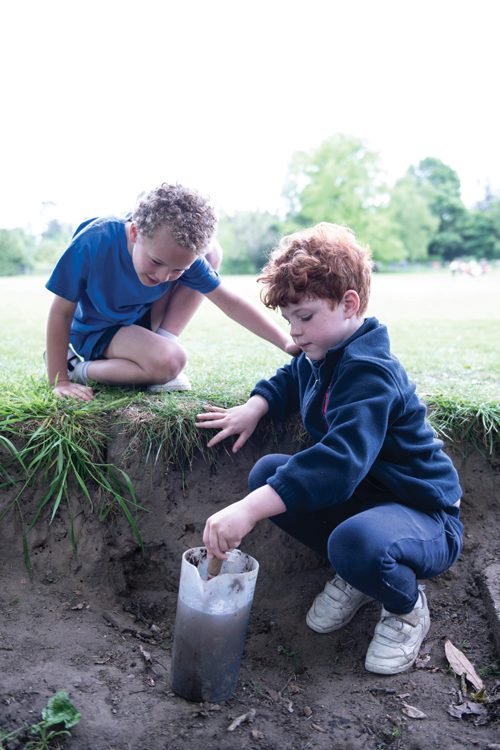
by Marcus Culverwell
Headmaster of Reigate St Mary’s School
The world is changing at a phenomenal rate and the education sector needs to respond effectively to this to make sure children are being properly prepared for their future. We need to equip young people with the right skills and knowledge to help them navigate a life where sustainability and protection of the planet are fundamental to the wellbeing of society as a whole. Schools must ask themselves – what will our children be doing in five years’ time? In 10 years’ time? Midway through their career – or, more likely, careers? How will they be changing the world for the better?
So, what can we do now to prepare them for the significant challenges ahead? It is important that children are encouraged to think ‘beyond the bubble’ of traditional schooling and we can help them do this by providing an education that includes:
• Giving back to society and the planet, more than they take – we live on a finite planet and we share our planet too.
• Taking sustainability seriously – practical application now and as future leaders in society.
• Recognising the personal value and economic importance of the natural environment – how eco-systems really work.
• Understanding how STEM (science, technology, engineering and maths) can be applied, creatively, to tackle real world problems.
• Philosophy for children – to dig deep into why humanity has got into the ecological predicament we are in, and how we change the story.
At our school we have an Education for Social Responsibility programme (ESR) that encompasses all of the above and helps children to think about the core values that will lead to happy and fulfilled lives, within stable and caring communities while protecting the planet for the future. At the heart of it is a focus on the wellbeing of each of them individually, the wellbeing of teams they will work within and the wellbeing of the planet.
A community outreach programme provides children with opportunities to be part of helping and sharing with the wider community, whether locally or globally. We have a designated member of staff who oversees this and pupils run teatime concerts for the elderly, take part in a Make a Difference challenge in Year 5 and there is a whole-school sponsored walk to raise money to build water tanks in Southern Uganda as well as a dedicated charity day.
It is important that sustainability is taken seriously with issues such as climate change and caring for the planet being woven into all areas of learning. Becoming an Eco school is a good start to this and having dedicated pupil Green Leaders to discuss and implement ways to reduce the school’s carbon footprint is an excellent way to stimulate debate. We also use water butts for left over drinking water, we are careful about use of paper, recycle old pens, encourage walking to school and discourage motorists from leaving car engines idling. Children even build and code model systems such as solar panels which track the sun across the sky.
There is huge personal wellbeing value within the natural environment. To harness this, children should have the chance to take their learning outside as often as possible. Concepts can be taught in relevant and practical ways and often children can solve problems and grasp concepts outside that they have had difficulty with when in the classroom. Connecting with nature is important for wellbeing. Any outside space can be used as a nature reserve for the children to learn Forest School skills, build bug hotels, and generally feel the benefit of being closer to the natural world.
Philosophy for Children (P4C) offers a way to open up learning through enquiry and the exploration of ideas. Children learn that their ideas have value, and that the ideas of other children have value too. They realise that they don’t always have to be right, but they gain the confidence to ask questions and learn through discussion. Each lesson promotes dialogue whereby participants ask questions, sift statements and explore alternatives. Above all, children will generate a greater understanding of each other and appreciate that not everyone believes the same thing, or thinks in the same way – and that is alright. Philosophy calls on imagination and reasoning and puts these capacities to work exploring values, assumptions and vital concepts like justice, truth, and knowledge.
Ultimately, all educators need to support young people to be good citizens, with the confidence to make the right decisions and the skills needed to lead happy and successful lives – lives which are significant in a positive way. We want them to be ideas generators, good listeners, open-minded, considerate colleagues, positive influences, go-getters, self-starters, good neighbours, game changers and change makers of the future.
Reigate St Mary’s is a junior school of Reigate Grammar School (RGS), rated ‘excellent in all areas’ in an ISI Inspection in March 2023. Children enjoy busy days filled with imaginative teaching and exciting adventures focusing on teamwork, creativity, digital learning and communication. www.reigatestmarys.org











